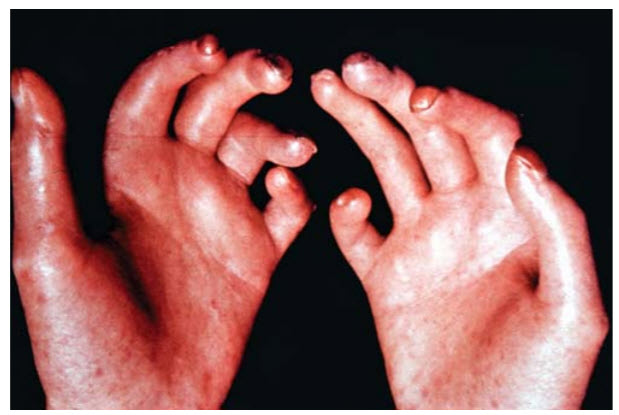Question 13#
A 37-year-old woman presents with progressive shortness of breath. The patient also reports painful joints over the past 5 months, especially in her fingers. She has a past medical history of GERD, which is controlled with omeprazole. On physical examination, the patient has thickened skin over the acral surfaces. Examination reveals the following figure.

Which of the following will likely be positive in this patient?
A. Anti-histone antibodiesB. RF
C. Anti-topoisomerase antibodies
D. Cytoplasmic antineutrophil cytoplasmic antibodies (c-ANCA)
Correct Answer is C
Comment:
Anti-topoisomerase antibodies. This patient likely has a diagnosis of systemic sclerosis, an autoimmune and connective tissue disease that is characterized by thickening of the skin from accumulation of collagen. There are two forms of systemic sclerosis: limited cutaneous scleroderma (i.e., CREST syndrome, which is limited to the skin on the face, hands, and feet) and diffuse cutaneous scleroderma (covers more of the skin and commonly involves the visceral organs such as the kidneys, heart, lungs, and gastrointestinal tract). Importantly, “CREST” refers to the five main features: Calcinosis, Raynaud phenomenon, Esophageal dysmotility, Sclerodactyly, and Telangiectasia. CREST syndrome is characterized by the presence of anti-centromere antibodies. Our patient is presenting with lung findings and therefore likely has the diffuse form of systemic sclerosis. This condition is characterized by the presence of anti Scl-70 antibodies (also called anti-topoisomerase I antibodies).
(A) Anti-histone antibodies are found in drug-induced lupus. Medications that are most likely responsible include hydralazine, procainamide, and isoniazid. (B) Rheumatoid factor (RF) is often found in rheumatoid arthritis but can also be found in a plethora of other autoimmune diseases. (D) Positive c-ANCA is found in granulomatosis with polyangiitis (Wegener granulomatosis).